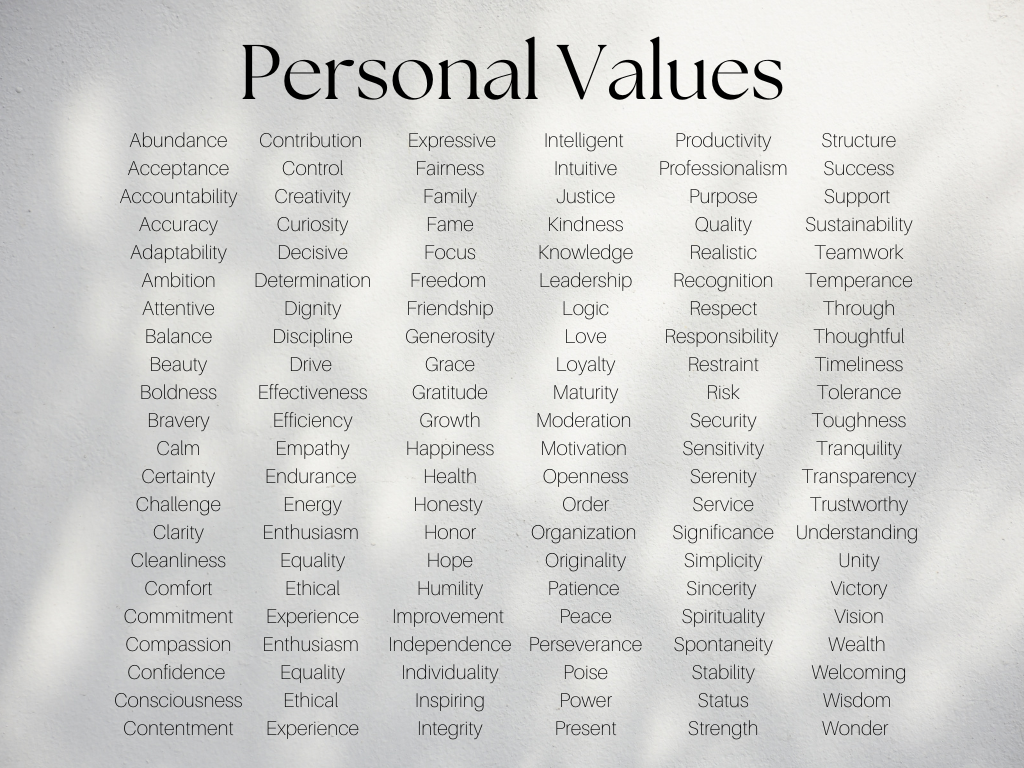
Core values are your northern star, that might have sounded somewhat cheesy and it may seem like an exaggeration, but it’s not.
So what’s so important about having your core values figured out? Well, the thing with life is, it takes a lot of unexpected twists and turns. Think of your work life, your love life, and your personal life. However, the constant across all boards is most likely your set of core values. They are values that were instilled within you from a young age. If you don’t know what I mean, then take a look at events that made you emotional. Such as something that you consider impolite or makes you feel angry, upset, or annoyed when someone does that. Let’s say you dislike it strongly when people lie to you, then honesty has most likely either been taught to you to be necessary via a caregiver or life taught you that it was important. Knowing them can give our lives a more defined direction.
The Core of Core Values
Firstly, we have to clarify how they are different from normal values. Core values are the values that you have within your core being. This just means they are your most important values and make you who you are. we all have core values, but we might not realize that we are living by them consciously, they are sort of the secret codes we live by. People will often recognize these core values as attributes of your character or your likes and dislikes. For example, Don’t be late when meeting with Adam he finds it rude. This means that Adam finds being on time important, to him this shows him people respect him. So Respect is a core value of Adam. I hope this explanation makes it a little less vague as this topic can be surprisingly unclear.
Tradeoff System
A commonly shared theory about core values is that they are a rigid set of supposed life principles by which you choose only three or five to live by. The issue with this is that values are constantly weighed and measured against each other to ultimately make a decision on whether or not to proceed or divert from an opportunity. It is more based on a flexible tradeoff system than a set priority system (Seligman et al, 1996). In the tradeoff system, some actions in favor of one core value may have consequences for another core value. However, this does not mean that this one particular core value is therefore more important than the other in any case, but that it is favored over others in that specific case.

Umbrella
Additionally, chapter one of Psychology of values: The ontario symposium by Seligman, explains the theory that individual values can be grouped into motivational-type umbrella terms. This is not to be confused with the traditionally recommended rigid method of choosing three to five individual values from a list, more on this in the next section. To clarify, things like success and ambition can fall under the umbrella term of achievement. The neat thing about this is that we can narrow down many individual values to an umbrella term (core value) in order to know what we are looking for emotionally and set our goals accordingly (Seligman et al, 1996).
A Core life
Nevertheless, It’s well worth getting through the vague fog of this topic, as knowing your core values can really help you align your life decisions to your personality, and help you live a life that you feel passionate about (Santos, 2014). Having a couple of core values keeps you focused on what truly matters to you personally. In times when things get chaotic or others want you to be someone you are not, it will be easier to stay on your own path and not get lost in the chaos or the paths of others. As Steven Hitlin puts it, “core values are what bind our various social identities into one cohesive personal identity” (Hitlin, 2003). Knowing this cohesive personal identity can help you make better and faster decisions that lead to a life that feels tailor-made for you.
List-ening
To conclude this post, have a look at this list with examples of personal value words (White, n.d.). Although they are individual values it is good to read through them and listen out for what speaks to you. Later we can group them into umbrella terms and find the common theme among them and reveal your core values.

The Takeaway
To go, core values bind our various social identities into one cohesive personal identity (Hitlin, 2003). Core values aren’t a fixed set of individual values ranked by priority. Instead, they should be seen as a flexible tradeoff system, where each core value is weighed against another on a case-by-case basis. If done right, your core values can help show you which direction to take in life. Knowing your direction will help you make faster and better decisions to get the tailor-made life you want. In the next post, finding your core values, we will go over two ways to find your core values.
Related Articles
06. Finding your core values
References:
Hitlin, S. (2003). Values as the Core of Personal Identity: Drawing Links between Two Theories of Self. Social Psychology Quarterly, 66(2), 118–137. https://doi.org/10.2307/1519843
Santos, M. C. (2014). The Happiness Project: Distressed Adolescents’ Search for Personal Meaning. Asian Journal of Social Sciences & Humanities, 3(4). Retrieved December 1, 2021, from http://www.ajssh.leena-luna.co.jp/AJSSHPDFs/Vol.3(4)/AJSSH2014(3.4-15).pdf
Seligman, C., Olson, J. M., & Zanna, M. P. (1996). Psychology of values: The ontario symposium (Vol. 8). New York: Psychology Press. doi:https://doi.org/10.4324/9780203773857
White, M. G. (n.d.). Examples of core values: 100 powerful principles. Example Articles & Resources. Retrieved from https://examples.yourdictionary.com/examples-of-core-values.html
Leave a Reply